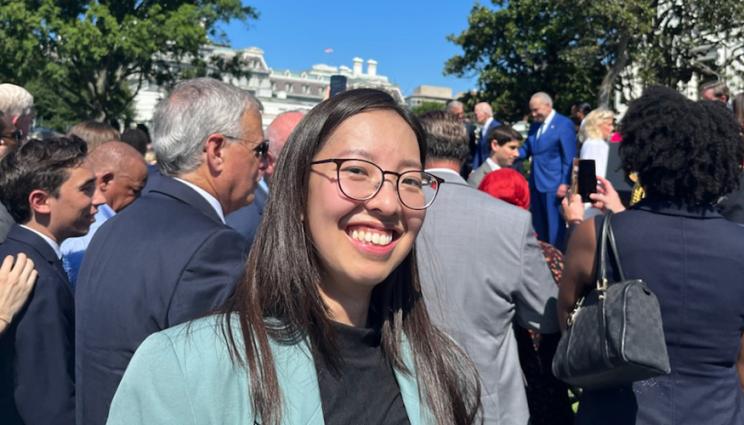
LLNL scientist Christine Y. Chen at the signing of the CHIPS and Science Act (CSC ACT). President Biden and Sen. Majority Leader Chuck Schumer are in the background. Photo by Vernon Morris.
This week, President Biden signed into law the bipartisan bill known as the CHIPS and Science Act (CSC ACT). The bill aims to strengthen U.S. competition by encouraging U.S. companies to manufacture semiconductors and by revitalizing "America's scientific research and technological leadership." Under Title V: Broadening Participation in Science of the bill, the White House will push to build a strong and diverse STEM workforce.
As part of this historic bill signing ceremony, Christine Yifeng Chen, a Lawrence Livermore National Laboratory (LLNL) scientist, and Vernon Morris, an Arizona State University professor - two co-authors of a preprint titled "Decades of Systemic Racial Disparities in Funding Rates at the National Science Foundation" - were invited to attend. Four of the seven co-authors, including lead author Chen, are early-career fellows or faculty of the Center for Diverse Leadership in Science at UCLA. The paper, which analyzed publicly available data, revealed racialized funding disparities at the National Science Foundation, building on similar results reported by other researchers for the National Institutes of Health and the Wellcome Trust in the United Kingdom. The manuscript also found the following patterns:
- Proposals by white principal investigators (PIs) have been funded above overall rates for at least two decades
- The relative funding rate for proposals by white PIs has been increasing with time
- Proposals by most BIPOC (Black, Indigenous and people of color) PIs have been funded below overall rates
The CSC Act will begin addressing these racialized funding disparities by supporting policy reforms, research and data collection to identify and lower barriers facing women, minorities and other groups underrepresented in science, technology, engineering and mathematics (STEM) studies and research careers.
Subtitle C of the CSC Act, the MSI (Minority Serving Institution) STEM Achievement Act, will direct federal science agencies and the Office of Science and Technology Policy (OSTP) to undertake activities to improve the quality of undergraduate STEM education and enhance the research capacity within the nation's Historically Black Colleges and Universities, Tribal Colleges and Universities, Hispanic Serving Institutions and Minority Serving Institutions.








